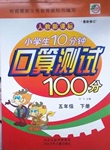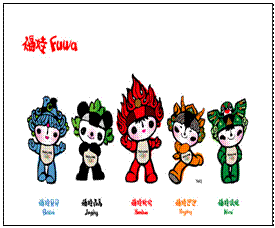题目内容
Friendlies abandoned as name for mascots(吉祥物)
The name "Friendlies" has been abandoned as the organization committee for the 2008 Beijing Olympics silently changed the English name of the Games' five mascot dolls last week. The organization committee decided to adopt the name "Fuwa", which is a pinyin translation of its Chinese name and is more frequently used in
However, the organization committee replaced all Friendlies to Fuwa on its official site, but without giving a formal announcement to inform the public of the change. It is said that they received an inside notice about the change last week but don't want to emphasize it for fear of affecting the sales of Olympic goods.
Li Yanjun, a Legal Affairs Department official, said the decision was made considering a variety of reasons but did not want to comment on them. "You may know about the background and many unfavorable comments concerning the mascots' former name across the web, but I won't comment on them," Li said. "I'm not in the position to make it clear if the change was caused by this."
A report published last week on China Radio International (CRI)made the name change known and listed the reasons why the Friendlies name should be changed. "Firstly, Friendly is somewhat an unclear name, which could refer both to friendly people and friendly matches,"a Dr. Li from
Laura Fitch, a Canadian who works in
41. why did the organization committee change the name “Friendlies” into “Fuwa” without giving a formal announcement?
A. Because it is not important to make it known.
B. Because everybody will know it by surfing the internet.
C. Because it will perhaps affect the sales of Olympic products.
D. Because all the people will criticize them for changing its name.
42. Which of the following is not true as the reasons for changing the name?
A. Friendly is a name with more than one meaning.
B. It is very easy for people to pronounce the name in a wrong way.
C. People are likely to split it as “Friend lies”.
D. “Friendly” is not a suitable name for Olympic goods.
43. What can be inferred from what Li Yanjun said in Para.3?
A. He liked the name while others didn’t.
B. He didn’t know how to comment on unfavourable comments.
C. It is likely that the change of the name was caused by the unfavourable comments.
D. People would not make unfavourable comments on “Friendlies” if they knew about the background.
44. What’s the people’s reaction to the change of the name according to the last paragraph?
A. approving B. exciting C. dislike D. not mentioned
CDCA

 小学生10分钟口算测试100分系列答案
小学生10分钟口算测试100分系列答案
| |||||||||||||||||||||||||||||||||||||||||||||||||||||||||||




 Five Olympic mascots were announced
exactly 1000 days before the Beijing Olympic opening ceremony. The
long--anticipated mascots represent four of China's most popular animals — the
fish, the panda, the Tibetan antelope and the swallow .The fifth mascot is the
brightly burning Olympic flame.
Five Olympic mascots were announced
exactly 1000 days before the Beijing Olympic opening ceremony. The
long--anticipated mascots represent four of China's most popular animals — the
fish, the panda, the Tibetan antelope and the swallow .The fifth mascot is the
brightly burning Olympic flame.